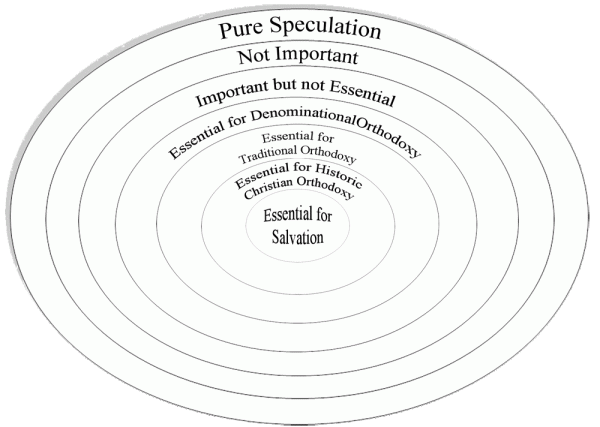For most Christian traditions and denominations, the age of the Earth is not a primary issue. It is not even a secondary issue. Nor is it a tertiary issue. In fact it is not even a quaternary issue. For most Christian traditions and denominations, the age of the Earth is a quinary issue! That’s three steps below being a matter of even secondary importance!
This does not mean that what we believe about origins is not important, but it helps to put the endless debate in proper perspective.
C. Michael Patton at Parchment & Pen Blog has a Chart to Help Distinguish Between Essentials and Non-Essentials.
Patton reserves the “Essential for Salvation” circle for those doctrines that one must believe in order to be a Christian by just about any definition. This includes belief in God, Christ’s deity and humanity; our sinfulness, and Christ’s death on the cross and resurrection.
The next circle includes those things that all Christians (Orthodox, Roman Catholic, Protestant) have believed from the beginning of the church, such as the doctrine of the Trinity as expressed in the Nicene Creed, the future return of Christ, the eternal punishment of the wicked, and belief that Christ is the only way to God. One might err on one of these (e.g. believe that all will in the end be saved) and still be a Christian, but not be within the standards of Christian orthodoxy.
The third circle from the center is traditional orthodoxy, which is orthodoxy as defined by one of the broad traditions of the Church: Eastern Orthodoxy, Roman Catholicism, and Protestantism. I fall within Protestant orthodoxy, believing in justification by grace alone through faith alone in Christ alone. I fall outside of Roman Catholic orthodoxy, as I reject its teachings about Mary.
I am well aware that there will be differences between Christian traditions and denominations about where to place various doctrines. Lutherans will bump baptism up a notch or two compared to most Evangelicals, and Pentecostals might move spiritual gifts more towards the center as compared to where most Episcopalians will.
Where do teachings about evolution and the age of the universe come into this?
Patton places what we believe about origins in the “important but not essential” category. I think I would place evolution and chronology at this level as well.
Most YEC leaders will state that origins are not a primary issue, that is, that one can believe in an old Earth and still be a Christian. I think the highest they could really put YEC is at the denominational orthodoxy level (though they might look at their denominational orthodoxy as the true standard of orthodoxy and throw out the higher levels entirely).
Many YEC followers seem to place YEC at the primary level, as in, “If you are not a YEC, you are probably not really a Christian.” I have actually run into that quite a bit.
What do you think? Where do the age of the universe and biological evolution fit on the diagram?
Grace and Peace


I would lean towards it being in the “important but not essential” circle, though I could see an argument for wanting denominational unity on the issue. I think this could go under whether you favor “humility” or “unity” regarding non-essentials.
Not to advertise too much, but I discuss the notion of church unity vs. humility regarding doctrines in a post I put up on the Reformation: http://jwwartick.com/2012/10/22/church-universal-reformation/
LikeLike
I’m glad this is a debate not essential to salvation.
But if a young person or a new Christian started to read the Bible from Gen 1:1, I think they would believe when the Word of God says 7 days, that’s what it meant. But to later find out that that could be allegorical, could lead them to disbelieve many of the facts within the Bible or have them thinking Abraham, Moses, David, Jesus, etc are all allegorical like the Lord of the Rings. So to insist that you can’t take the Bible literally is walking on a dangerous line. But at least this debate is as you say open ended and doesn’t directly have anything to do with salvation.
I would put it between essential for historic and important but not essential.
LikeLike
I don’t think everyone reads Genesis 1 and just assumes it is seven 24 hour days. I have encountered more than one skeptic turned Christian who admitted surprise on finding out that so many people insisted that was the only possible reading, because it hadn’t occurred to them until someone told them about it.
LikeLike